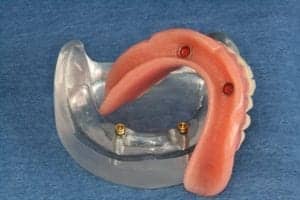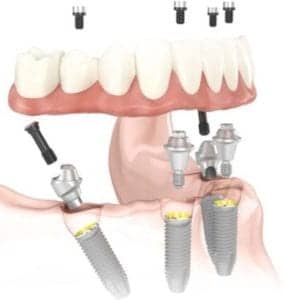I’ve had a consultation with a few dentists for dental implants. One them explained that he only placed screw-retained crowns with his dental implants and that is why he has a higher rate than his colleagues in successful dental implant cases. I haven’t found a way to verify that, so could you help me understand the differences in the types of implant crowns and whether they make a difference?
Casey
Dear Casey,

Generally, there are two ways of bonding on a dental crown to dental implants. The first bonds it on with cement. The second is the screw-retained crowns one of your potential dentists mentioned.
Cemented Crowns to Dental Implants
As its name implies, this type of crown uses cement to bond it on. The biggest problem with this type of crown is the potential for infection. No matter how careful a dentist is, some of the cement will seep out. They then use handtools to remove the remainder of cement.
However, if any gets left, at best it will irritate your gums and trap bacteria. At worst, it will flare up an infection leading to dental implant failure.
Screw-Retained Crowns for Dental Implants
There are two big advantages to using a screw-retained crown for your dental implants. The biggest is it avoids the cement, which as you’ve learned can cause some complications.
The second advantage is if the crown ever needs to be
You should be aware there are times a screw-retained crown isn’t possible. It takes longer to place these and some patients just aren’t able to keep their mouths open that long. However, using dental sedation can eliminate this problem, allowing the patient to sleep through the procedure.
Another reason is if the placement of the dental implant won’t allow for it due to aesthetic reasons.
The key to a successful dental implant procedure is the training and experience of the dentist. Focus on that rather than the type of crown. For instance, look at Dr. Pumphrey’s dental implant training to get an idea of what type of dentist you’re looking for.
This blog is brought to you by Atlanta Periodontist Dr. David Pumphrey.









